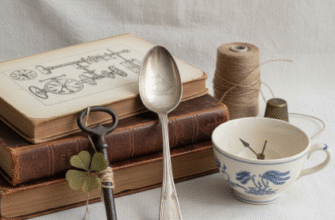Ever find yourself knocking on a wooden table after boasting about your good fortune? Or perhaps you’ve carefully sidestepped a crack in the pavement, just in case. These little rituals are woven into the fabric of our daily lives, often performed without a second thought. We might laugh them off as silly habits, but these superstitions are ancient echoes, whispers from a time when the world seemed a much more mysterious and dangerous place. They are fossils of belief, preserved in our collective psyche. Delving into their origins is like an archaeological dig into the minds of our ancestors, revealing a fascinating tapestry of fear, faith, and a desperate need to find order in chaos.
The Hidden Logic Behind Our Quirks
What’s truly remarkable is that most superstitions aren’t entirely random. They often stem from a logical, albeit outdated, understanding of the world. They are the remnants of ancient religions, misinterpreted historical events, or simple cause-and-effect observations that have been passed down through generations. Let’s pull back the curtain on some of the most common beliefs and see the surprising stories they have to tell.
Knocking on Wood: Appeasing the Spirits
This is one of the most pervasive superstitions in the Western world. The act of “knocking on wood” for good luck has roots that stretch deep into pagan beliefs. Ancient cultures, particularly those of the Celts and Druids, believed that spirits and gods resided in trees. Tapping or knocking on the trunk of a tree was a way to communicate with these entities. You might do it to ask for a blessing, to show gratitude for a stroke of good luck, or even to distract any malevolent spirits who might be listening in and tempted to reverse your fortune. It was a sign of respect to the powerful forces believed to inhabit the natural world. With the rise of Christianity, the belief was cleverly adapted. The “wood” became associated with the wood of the Christian cross, and touching it was seen as a way of invoking the protection of God.
Broken Mirrors and Fractured Souls
The dread that accompanies the sound of shattering glass from a mirror is a powerful one. The belief that breaking a mirror brings seven years of bad luck is a potent combination of ancient Roman and Greek ideas. The Romans were among the first to create glass mirrors and believed that a mirror didn’t just reflect your physical appearance—it held a reflection of your very soul. To break a mirror was, therefore, to damage or fracture your soul, leaving you vulnerable to misfortune and spiritual sickness. So, where does the seven-year sentence come from? That’s also from the Romans, who held the belief that life renewed itself in seven-year cycles. They believed that your body and soul were completely regenerated every seven years. Thus, if you fractured your soul by breaking a mirror, you had to endure a long wait for it to naturally heal and become whole again. It was a full life cycle of bad luck before you could start fresh.
Spilling Salt: A Costly Mistake
Accidentally knocking over the salt shaker might seem like a minor inconvenience today, but it was once considered a disastrous omen. The reason is simple: salt was incredibly valuable. For much of human history, it was a rare and precious commodity, essential not just for flavoring food but for preserving it in a world without refrigeration. It was so valuable that it was used as a form of currency.
Salt was a cornerstone of ancient economies. Its importance went far beyond flavoring food; it was a primary method for preserving meat and fish. Roman soldiers were partially paid in salt rations, a payment known as ‘salarium argentum,’ which is the direct root of our modern word ‘salary.’ This historical value is why spilling it was considered such a grave and unlucky act.
Spilling something so precious was seen as an invitation for evil. The prescribed antidote—throwing a pinch of the spilled salt over your left shoulder—also has specific roots. The left side has historically been associated with evil and dishonesty (the Latin word for left, ‘sinistra,’ is the root of our word ‘sinister’). The belief was that the Devil himself lurked over your left shoulder, waiting for an opportunity to cause chaos. Tossing salt into his face was a way to blind him and ward off the bad luck you had just invited into your home.
Walking Under a Ladder: More Than Just a Safety Hazard
While walking under a ladder is genuinely a bad idea for practical safety reasons, the superstition surrounding it is far more mystical. The primary origin is tied to Christian symbolism. A ladder leaning against a wall forms a triangle, a shape that for centuries has represented the Holy Trinity of the Father, the Son, and the Holy Spirit. To walk through this “holy” triangle was considered blasphemous; you were seen as violating a sacred space and siding with the Devil. Another, more gruesome association comes from medieval times. Victims on their way to the gallows often had to pass under the ladder used by the hangman, cementing its connection with death and misfortune. It became a symbol that you were walking in the path of the condemned.
Black Cats: A Tale of Two Reputations
Few creatures have such a polarized reputation as the black cat. Whether it’s a sign of good luck or bad depends entirely on where you are in the world. In ancient Egypt, all cats were revered, associated with the goddess Bastet, and killing one was a capital crime. A black cat crossing your path was a blessing. This positive image persisted for centuries until the Middle Ages in Europe. As the Christian Church sought to stamp out all forms of paganism, the black cat became a target. They were associated with witches, often believed to be their “familiars”—demonic spirits in animal form sent to do their bidding. An elderly woman living alone with her cats was a prime target for witch-hunters, and her feline companions were deemed guilty by association. This fearful image traveled with colonists to America and became embedded in folklore, especially around Halloween. Yet, in other parts of the world, like the UK and Japan, a black cat is still considered a powerful omen of good fortune.








